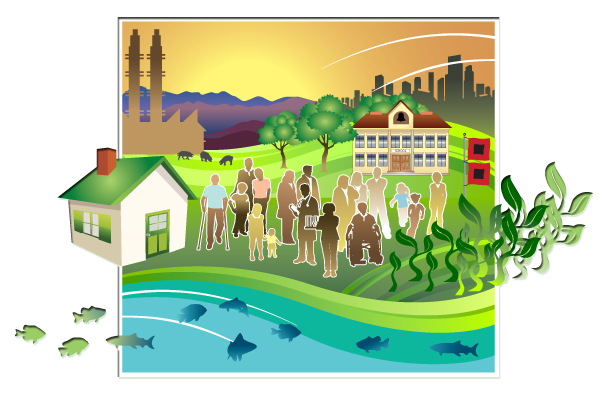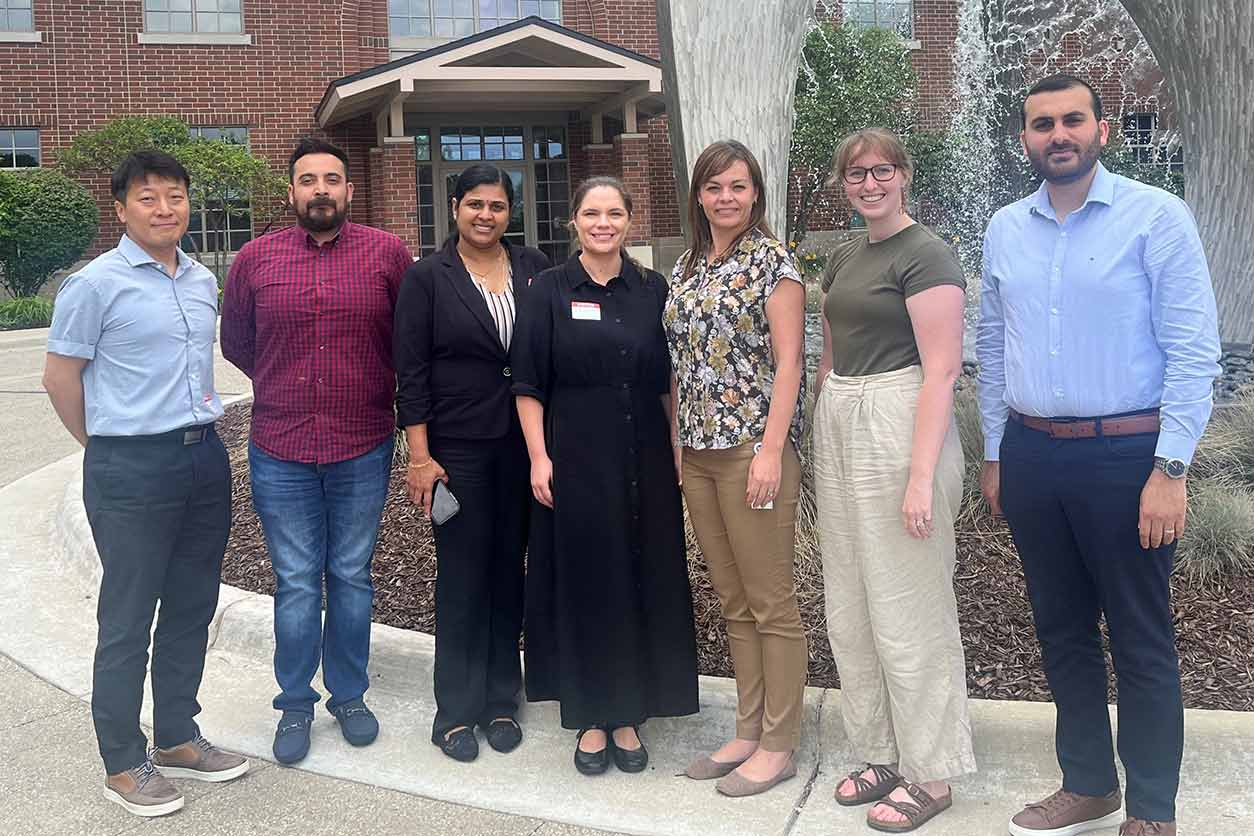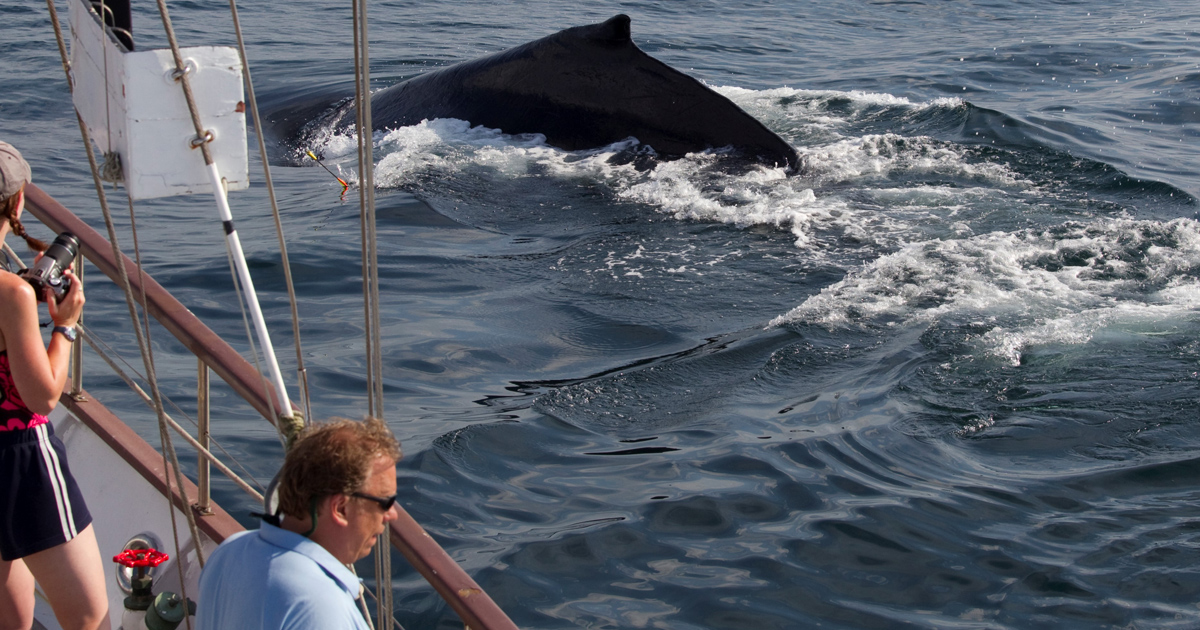Reducing Exposure to Endocrine-Disrupting Chemicals by Improving Environmental Health Literacy
Providing people with information on their exposure to harmful chemicals may motivate them to take actions that reduce their exposures and risks of potential adverse health effects. With this outcome in mind, an NIEHS-supported team made up of a private biotechnology company and academic researchers from the University of Nevada conducted an intervention to reduce participants’ exposure to endocrine-disrupting chemicals (EDCs). EDCs are found in many plastic and personal care products.
The research team measured participants’ EDC levels by urinalysis and reported back the results. In the personalized reports, the team provided participants with details on the health effects associated with certain exposures and ways to reduce contact with those environmental factors. An accomplished goal was to improve environmental health literacy among participants -- their ability to understand and use environmental health information.
A July 2024 publication describes the findings from the study which suggested that participants successfully used the information provided to them to reduce exposure to EDCs.
Reporting Back Chemical Exposure Results
The research team at Million Marker, funded by the NIEHS Small Business Innovation Research program, recruited participants from the Healthy Nevada Project, a population health and genetics study that has collected data from 50,000 Nevada residents. While the project has returned genetic testing results to participants since 2018, the researchers had not previously examined environmental exposures. Million Marker produces a direct-to-consumer urine test for EDCs, including bisphenols, such as Bisphenol-A, phthalates, parabens, and oxybenzone. Through this test, it was possible to examine environmental exposures among project participants.
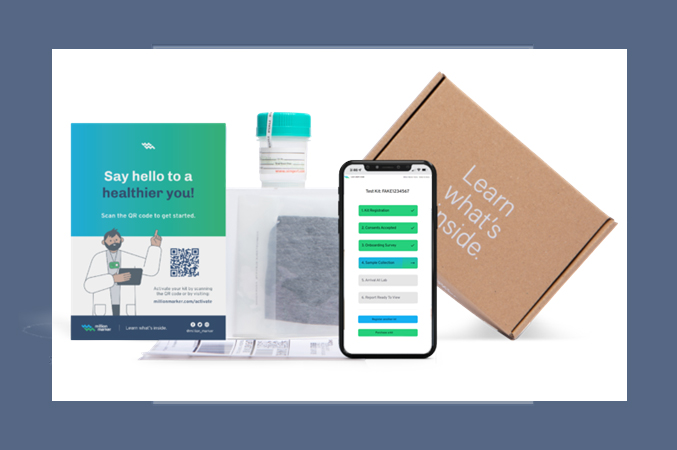
Components of the Million Marker test kit are shown along with a screen shot of the online resource. (Photo courtesy of Jenna Hua)
Exposure to some EDCs has been linked to reduced fertility and increased risk of chronic diseases such as type 2 diabetes and heart disease. In fact, the Centers for Disease Control and Prevention found that 93% of people in the U.S. have detectable levels of bisphenol A in their urine.
“The direct-to-consumer mail-in urine tests can help people see the biomarkers of exposures to harmful EDCs, such as the more well-known type, bisphenol A,” stated Jenna Hua, Ph.D., M.P.H., R.D., founder and chief executive officer of Million Marker, and lead researcher on the study. “Our hopes are to expand to grow the field of screening for EDCs and report-back, as well as other harmful environmental chemicals.”
The study examined urine samples and survey results from 56 Healthy Nevada Project enrollees. Participants completed three initial surveys about their environmental health literacy, readiness to change their behavior to reduce exposure to harmful chemicals, and digital literacy to assess their comfort in accessing study information, which was to be provided digitally. The environmental health literacy survey was adapted from the General Environmental Health Scale, and the digital literacy survey was adapted from the Digital Health Literacy Instrument. Participants also provided a urine sample that was analyzed by the research team to determine EDC levels. The team reported these results back to participants along with information to increase participants’ environmental health literacy about EDCs.

EDCs are found in a variety of consumer products including plastics and personal care products. (Photo courtesy of SHVETS production)
Personalized materials provided information on potential health effects, sources of exposure, and recommendations to reduce exposure depending on which EDCs were found in the urine samples. Some participants completed an exposure journal the day before taking the urine sample, and report-back materials for these participants included additional information based on their journal entries.
Participants then completed another urine test. They also completed a second round of surveys to assess environmental health literacy, readiness to change, and usability of the digital report-back features of the study, including the platform that returned the urinalysis results.
Participants Reduced Their Exposure to Phthalates
Participants indicated they had fewer challenges after the intervention, suggesting they learned feasible ways to reduce exposure. Researchers found that women were more likely than men to report they were planning to change or currently changing behaviors to reduce exposures. Other survey results showed more men than women reported their current chemical exposures were not harming them.
“Perhaps the report-back of results reinforced to some participants that they were not exposed to a high number of harmful EDCs, or that the understanding of the health effects of EDCs were not sufficient to warrant behavior change,” reflected Hua. “Either way, the reasons behind the differences here between men and women are unclear, so it is a point that we would like to explore with further research.”
The improved environmental health literacy results were complemented by reductions in phthalates detected in the urine samples. All participants had reduced urine levels of EDCs after receiving their initial test results and the information on EDCs.
The majority of participants also stated that the digital resources were easy to use and that the report-back materials were easy to understand and helpful.
The research team is currently working on expanding the study to a larger number of participants. The study will be a randomized clinical trial to further study the report-back intervention. The team is also testing an environmental health literacy education and coaching curriculum that aims to promote environmental health literacy and behaviors to reduce exposure to EDCs.
NIEHS Environmental Justice Action Forum Report Now Available
In September, NIEHS released the final report from a one-day forum that addressed environmental justice issues around a former missile plant in North Carolina. Toxins from the plant have polluted nearby groundwater, air, and soil. In light of the complexities surrounding the site, the workshop organizers used an “All-of-Government” approach to seek new ideas and innovative solutions. The forum, which was held in November 2023, was the result of a multi-year collaboration with several community-based organizations, local and state officials, and federal agencies. The report summarizes key takeaways and actions from the forum, which encouraged commitments from stakeholders to clean up the site and work toward a revitalized neighborhood. A remediation advisory board was established and several coordination efforts resulted from the forum.
U.S. Environmental Protection Agency Updates EJScreen
The U.S. Environmental Protection Agency released its annual update to EJScreen in July. EJScreen is the publicly available environmental justice screening and mapping tool that provides users with a consistent approach for combining environmental and socioeconomic indicators. The updated version has new environmental indicators, such as noncompliance of drinking water systems; new map layers, such as extreme heat and private drinking water wells; interface improvements; and updated demographic data from the 2018-2022 American Community Survey from the U.S. Census Bureau. The updated version of the tool also has new features to support users in learning the tool, such as popups and a base map. For a complete list of updates, you can read the July 2024 Changes and Updates. You can also watch a five-minute video for a quick overview of the tool.
U.S. Environmental Protection Agency Announces Environmental and Public Health Prizes for Rural Areas
The U.S. Environmental Protection Agency announced the winners of the Small Communities, Big Challenges prize competition in June. This initiative recognizes the efforts of local governments in rural areas to address environmental and public health challenges. The winning teams engaged with their communities to tackle issues such as water quality, indoor air quality, radon levels, food waste, and recycling. For example, a prize-winning project in Washington state focuses on reducing food waste, as decomposing food in landfills contributes to the emission of greenhouse gases. The strategy includes providing a community “freedge,” which will offer free, surplus food from restaurants to residents. The project builds off a food landscape assessment developed by a graduate student and years of community engagement. The prize competition addresses a longstanding need because rural communities often receive less support and have higher poverty rates compared to urban communities.

PEPH Environmental Health Chat Podcast Series
Understanding Exposures to Microplastics and Nanoplastics
PEPH Environmental Health Chat Podcast Series
Understanding Exposures to Microplastics and Nanoplastics
How tiny, ubiquitous bits of plastic affect human health is uncertain. Single-use plastic bags and other plastic waste break down into these small bits, called microplastics and nanoplastics, which have been found in water, food, and human tissue, such as reproductive tissues and lungs. In this episode, NIEHS-funded researcher Phoebe Stapleton, Ph.D., talks about her research on the potential health effects of micro- and nanoplastics in the body and discusses practical tips to reduce exposure.
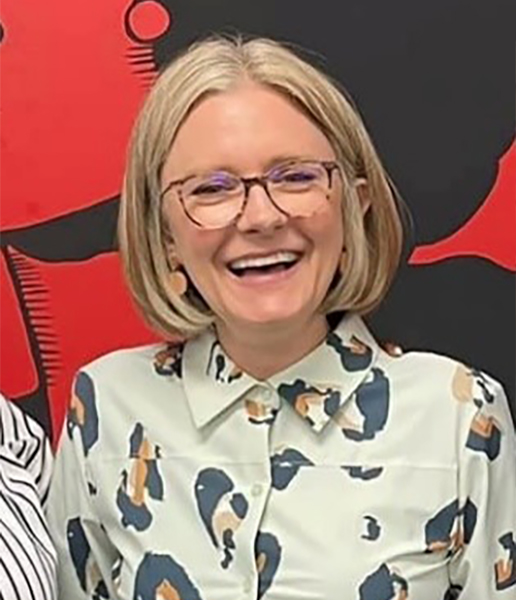
PEPH Grantee Highlight
Carrie Leach, Ph.D.
Carrie Leach, Ph.D., works on developing person-centered strategies for providing information to traditionally hard-to-reach people such as older adults. Leach is a researcher at Wayne State University’s Institute of Gerontology and co-leads the NIEHS-funded Community Engagement Core of the Center for Urban Responses to Environmental Stressors. The Center’s work focuses on how urban exposures to chemical and non-chemical stressors influence human health. Leach is also involved in a collaboration that is creating a program to promote older adults’ participation in science and research. Read more about grantee.
Funding Opportunities
Intervention Research to Improve Native American Health (R01 Clinical Trial Optional)
Supports research on interventions to improve health in Native American populations, including:
- Etiologic research that will directly inform intervention development or adaptations.
- Research that develops, adapts, or tests interventions for health promotion, prevention, treatment, or recovery.
- Where a sufficient body of knowledge on intervention efficacy exists, research on dissemination and implementation that develops and tests strategies to overcome barriers to the adoption, integration, scale-up, and sustainability of effective interventions.
The inclusion of Native American investigators serving on the study team or as the program director or principal investigator is strongly encouraged. This funding opportunity is part of the Intervention Research to Improve Native American Health initiative, which also includes Intervention Research to Improve Native American Health (R21 Clinical Trials Optional), and Intervention Research to Improve Native American Health (R34 Clinical Trial Optional). For the R01 and R21 funding mechanisms, NIEHS is interested in applications that focus on the development, adaptation, efficacy, effectiveness, implementation, or sustainability of culturally appropriate interventions to prevent or mitigate the health impacts of environmental exposures that disproportionately impact Native American populations. For the R34 funding mechanism, NIEHS is interested in applications that support the initial development of a culturally appropriate clinical trial or research project in preparation for health promotion or disease prevention interventions addressing the health impacts of environmental exposures that impact Native American populations.
Deadline: October 1, 2024
NOSI: Data Informed, Place-Based Community-Engaged Research to Advance Health Equity
This NOSI is meant to stimulate community-engaged research that leverages geospatial data to probe the influence of geographic factors on disease development and health outcomes. Its goal is to use place-based research to help advance health equity in different communities. Applicants must select the institute or center and associated Notice of Funding Opportunity (NOFO) to use for submission of an application in response to the NOSI. NIEHS is interested in applications that integrate place-based environmental data with other data types and sources (such as human behavior and time-activity patterns, environmental data collected by low-cost sensor networks or wearable technologies, biomonitoring data, and other molecular or clinical outcome data) to improve exposure estimates at both the community and individual level, to advance understanding of the effects of environmental exposures on health outcomes, and to inform prevention and intervention strategies. Applicants may apply through PA-20-185 or PA-20-195.
Deadline: October 5, 2024
Maximizing Opportunities for Scientific and Academic Independent Careers (MOSAIC) Postdoctoral Career Transition Award to Promote Diversity (K99/R00 Independent Clinical Trial Not Allowed)
Supports a cohort of early career, independent investigators from diverse backgrounds (for example, individuals from underrepresented groups) conducting research in NIH mission areas. The program has two components: an individual career transition award for postdoctoral scholars (K99/R00) and a research education cooperative agreement (UE5) awarded to organizations to provide these scholars with additional mentoring, networking, and professional development activities to support their transition to and success in independent, tenure-track or equivalent research-intensive faculty careers. This Notice of Funding Opportunity (NOFO) is designed specifically to support candidates proposing research that does not involve leading an independent clinical trial, a clinical trial feasibility study, or an ancillary clinical trial. Candidates seeking support through this NOFO are permitted to propose a research experience in a clinical trial led by a mentor or co-mentor. Candidates proposing a clinical trial or an ancillary clinical trial as lead investigator, should work with their institutions to apply to the companion NOFO PAR-24-226. Candidates proposing to work on basic experimental studies with humans should apply to PAR-24-227.
Deadlines: October 12, 2024; February 12, 2025; June 12, 2025
NIH Pathway to Independence Award (Parent K99/R00 Independent Basic Experimental Studies with Humans Required)
Helps postdoctoral researchers complete needed mentored training and transition to independent tenure-track or equivalent faculty positions. The K99/R00 award is intended to foster the development of an independent research program that will be competitive for subsequent independent funding and that will help advance the mission of NIH. Candidates must have no more than four years of postdoctoral research experience at the time of the initial or the subsequent resubmission or revision application. All applications submitted to this NOFO must propose basic science experimental studies involving humans. Prospective studies with humans conducted with specific applications toward processes or products in mind, including Food and Drug Administration Phase 0 or 1 studies, mechanistic clinical trials (e.g., those that examine the mechanisms by which an intervention works or the processes that account for an intervention's effects on clinical outcome), and safety and efficacy studies should submit under NIH Pathway to Independence Award (Parent K99/R00 Independent Clinical Trial Required). Observational studies involving humans should submit under NIH Pathway to Independence Award (Parent K99/R00 Independent Clinical Trial Not Allowed).
Deadline: October 12, 2024
Mentored Research Scientist Development Award (Parent K01 Independent Basic Experimental Studies with Humans Required)
Provides support and protected time (3 to 5 years) for an intensive, supervised career development experience in the biomedical, behavioral, or clinical sciences leading to research independence. All applications submitted to this funding opportunity must propose basic science experimental studies involving humans, otherwise referred to in NOT-OD-18-212 as “prospective basic science studies involving human participants,” that fall within the NIH definition of a clinical trial and also meet the definition of basic research. Companion funding opportunities are available for mentored research that is not categorized as a basic experimental study. The Mentored Research Scientist Development Award (Parent K01 - Independent Clinical Trial Not Allowed) supports research that does not involve leading an independent clinical trial, a clinical trial feasibility study, or an ancillary clinical trial, but applicants may propose a research experience in a clinical trial led by a mentor. The Mentored Research Scientist Development Award (Parent K01 - Independent Clinical Trial Required) supports applicants proposing to serve as the lead investigator of an independent clinical trial, a clinical trial feasibility study, or a separate ancillary study to an existing trial.
Deadline: October 12, 2024
Academic Research Enhancement Award (AREA) for Undergraduate-Focused Institutions (R15 Clinical Trial Not Allowed)
Supports small scale research grants at institutions that do not receive substantial funding from NIH, with an emphasis on providing biomedical research experiences primarily for undergraduate students and enhancing the research environment at applicant institutions. The research project must involve undergraduate students, and the research team must be composed primarily of undergraduate students. Student involvement in research may include participating in the design of experiments and controls, collecting and analyzing data, performing and troubleshooting experiments, presenting at meetings, drafting journal articles, participating in lab meetings to discuss results and future experiments, and other activities. NIEHS requires that applications submitted to this funding opportunity have a research focus on exposure-health-related responses from environmental agents within the mission interest of NIEHS (e.g., industrial chemicals or manufacturing byproducts, metals, pesticides, herbicides, air pollutants and other inhaled toxicants, particulates or fibers, fungal, and bacterial or biologically derived toxins).
Deadline: October 25, 2024
Notice of Intent to Publish a Funding Opportunity Announcement for Environmental Health Disparities Centers (P50)
The National Institute of Minority Health and Health Disparities in partnership with NIEHS and the National Cancer Institute plans to publish the Environmental Health Disparities (EHD) Centers funding opportunity in summer 2024. EHD Centers will conduct environmental health disparities and environmental justice research, engage in research capacity building, and provide training across diverse disciplines and backgrounds with a disease agnostic focus. The Centers program will be updated to align with recent executive order (EO 14096) focused on environmental justice. For this renewal the program will focus on the prevention and mitigation of adverse environmental exposures that disproportionately impact racial, ethnic, under resourced and underserved populations. Projects must focus on one or more NIH-designated health disparities populations within the U.S. and its territories, specifically racial and ethnic minority and socioeconomically disadvantaged populations and with the intersection of persons with disabilities, sexual and gender minorities, and persons from rural and/or under resourced areas.
Anticipated Deadline: November 1, 2024
Revolutionizing Innovative, Visionary Environmental Health Research (RIVER) (R35 Clinical Trial Optional)
Supports investigators who demonstrate the potential to conduct outstanding, innovative, and transformative research and articulate a clear and compelling vision for revolutionary research to advance the environmental health sciences. Key features and benefits of the program fall into two large categories: (1) freedom from traditional focused specific aims and a structured research plan which will enable investigators to pursue new directions in their research as they arise throughout the funding period, and (2) the ability to devote increased effort to research, mentoring, and scientific service due to reduced time spent writing and managing multiple grant applications and awards. These features are intended to facilitate ambitious, creative research strategies by providing a flexible and stable funding environment within a given scientific domain with broadly stated 'goals,' rather than specific aims, and by integrating emerging techniques that might be employed to address them, rather than providing specific experimental details.
Deadline: November 1, 2024
NOSI: Promoting Data Reuse for Health Research
Promotes data reuse and secondary data analysis to drive advancements in biomedical, behavioral, clinical, or health-related research. For this NOSI, applications must:
- Focus on advancing scientific inquiry and addressing pivotal health research questions via data reuse or secondary data analysis.
- Include data from at least one publicly accessible, NIH-funded data repository or knowledgebase.
- Describe how results and best practices for data reuse are to be shared with NIH and the broader community.
Deadline: November 4, 2024
Environmental and Climate Justice Community Change Grants Program
EPA is accepting applications for its Environmental and Climate Justice Community Change Grants program. The program provides Inflation Reduction Act funds in environmental and climate justice activities to benefit disadvantaged communities through projects that reduce pollution, increase community climate resilience, and build community capacity to address environmental and climate justice challenges. These place-based investments will be focused on community-driven initiatives to be responsive to community and stakeholder input. The entities eligible to apply under this opportunity are:
- A partnership between two community-based nonprofit organizations.
- A partnership between a community-based nonprofit organization and one of the following:
- A federally recognized tribe.
- A local government.
- An institution of higher education.
Other organizations and entities may be able to participate and be involved in the Community Change Grants projects as collaborating subrecipients and/or procurement contractors selected in compliance with competition requirements. EPA is accepting applications on a rolling basis; therefore, interested applicants are encouraged to apply early. To apply for this opportunity, see the announcement on Grants.gov.
Deadline: November 21, 2024
NIH Support for Conferences and Scientific Meetings (Parent R13 Clinical Trial Not Allowed)
Supports high-quality scientific conferences that are relevant to NIH's mission and to public health. A conference is defined as a symposium, seminar, workshop, or any other organized and formal meeting, whether conducted face-to-face or via the internet, where individuals meet for the primary purpose of exchanging technical information and views or exploring or clarifying a defined subject, problem, or area of knowledge, whether or not a published report results from such meeting. NIH encourages conference grant applicants to enhance diversity by increasing the participation of individuals from diverse backgrounds, including those from underrepresented groups, in the planning, implementation, and participation in the proposed conference. Eligible organizations include higher education institutions, nonprofits, for-profit organizations, local government (including Indian/Native American Tribal Governments), federal government, and other organizations such as faith-based or community-based organizations.
Deadline: December 12, 2024
PHS 2024-2 Omnibus Solicitation of the NIH, CDC, and FDA for Small Business Innovation Research Grant Applications (Parent SBIR [R43/R44] Clinical Trial Not Allowed)
Invites eligible United States small business concerns to submit Small Business Innovation Research (SBIR) Phase I, Phase II, Direct to Phase II (NIH Only), Fast-Track (NIH only), and Phase IIB (NIH only) grant applications. The SBIR/STTR Program Descriptions and Research Topics for NIH, CDC, and FDA represent scientific program areas that may be of interest to applicant small businesses in the development of projects that have potential for commercialization. SBIR applications that propose clinical trial(s) should be submitted to PA-24-246. Small business applicants interested in submitting an STTR grant application should submit to PA-24-247 or PAR-24-248.
Deadlines: January 5, 2025; April 5, 2025
Notice of Special Interest (NOSI): Innovative Technologies for Research on Climate Change and Human Health
This NOSI encourages grant applications from small business concerns to develop commercializable tools, resources, and approaches to capture the effects of climate change and the associated impacts of extreme weather events on human health, and to support adaptation or mitigation strategies to minimize health hazards and impacts from climate change. Technologies may include new approaches for detecting climate change-associated exposures, including temperature and air quality, training tools on climate change and mitigation strategies for patients with underlying health conditions, intervention approaches for reducing contaminants in water or in indoor air, modeling and prediction tools for climate change-related weather events and related health effects, and technologies for delivery of health care, including mental health services to communities during extreme weather events. This NOSI supports NIEHS’ Climate Change and Health Initiative. Applications are to be submitted through the SBIR (PA-24-245 or PA-24-246) or STTR (PA-24-247 or PAR-24-248) solicitations.
Deadlines: January 5, 2025; April 5, 2025
Support for Research Excellence (SuRE) Award (R16 Clinical Trial Not Allowed)
Supports research capacity building at institutions that award baccalaureate and/or graduate degrees in biomedical sciences and receive limited NIH Research Project Grant funding. SuRE-supported projects must have student participation in the execution, analysis, and reporting of the research. An applicant institution must demonstrate a commitment to build its research capacity and support for the program director/principal investigator of the award. This funding opportunity requires a Plan for Enhancing Diverse Perspectives (PEDP) as described in NOT-MH-21-310, submitted as Other Project Information as an attachment (see Section IV). Applications submitted to this funding opportunity for consideration by NIEHS must have a research focus on exposure-health-related responses from environmental agents within the mission interest of NIEHS (e.g., industrial chemicals or manufacturing byproducts, metals, pesticides, herbicides, air pollutants and other inhaled toxicants, particulates or fibers, fungal, and bacterial or biologically derived toxins). The Support for Research Excellence – First Independent Research (SuRE-First) Award (R16 - Clinical Trial Not Allowed) is also open. The purpose of this funding opportunity is to support faculty investigators who have not had prior independent external research grants, to furnish students with high-quality undergraduate and/or graduate research experiences and to enhance the institutional scientific research culture.
Deadline: May 28, 2025
Upcoming PEPH-related Events
EPA Tools and Resources Training Webinar Series: Equitable Resilience Builder. EPA provides detailed overviews and tutorials on its popular tools. The October webinar will focus on the Equitable Resilience Builder, an application that helps communities with their resilience planning.
International Society of Exposure Science Annual Meeting: Exposures that Impact Health in Vulnerable Populations (Montreal, Québec). Participants will hear about research in exposure science, epidemiology, toxicology, and risk assessments. The meeting will bring together participants from academia, government, and nonprofit organizations. Registration for the annual meeting is available.
American Public Health Association (APHA) 2024 Annual Meeting and Expo (Minneapolis, Minnesota). The theme of the annual APHA meeting is Building Trust in Public Health and Science. The meeting will include a session on report-back as well as poster sessions and opportunities for networking. Registration for the APHA meeting and expo is open.
EPA Tools and Resources Training Webinar Series: ECOTOX Knowledgebase and PFAS Updates. EPA provides detailed overviews and tutorials on its popular tools. The December webinar will focus on updates on PFAS and on the Ecotoxicology (ECOTOX) Knowledgebase Resource Hub, which provides information on the adverse effects of chemical stressors to ecologically relevant species.
Association for Advancing Participatory Sciences: 2025 Conference for Advancing Participatory Sciences (Portland, Oregon). The 2025 Conference for Advancing the Participatory Sciences will feature workshops, collaborative discussions, networking events, and symposia to promote the participatory sciences. The conference brings together researchers, facilitators, and community leaders. The call for symposia and call for workshops are open until September 20, 2024. Registration for the conference will open in early 2025.




